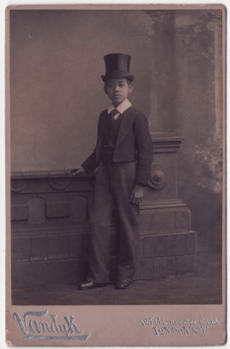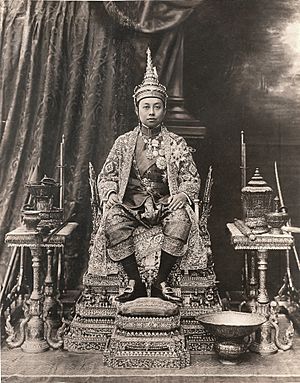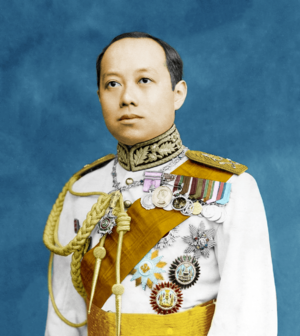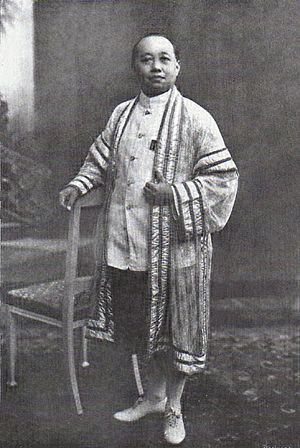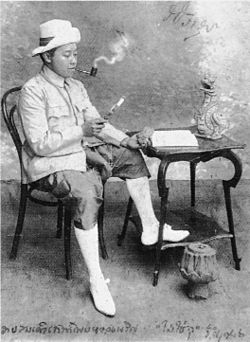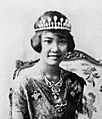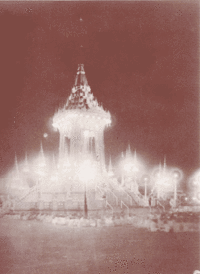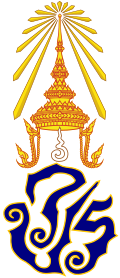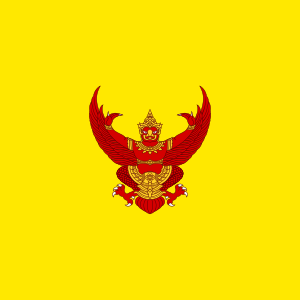Vajiravudh facts for kids
Quick facts for kids Vajiravudhวชิราวุธ |
|
|---|---|
| King Rama VI | |
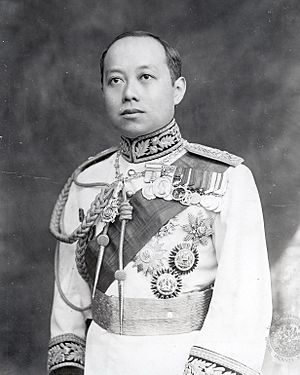
King Vajiravudh c. 1920
|
|
| King of Siam | |
| Reign | 23 October 1910 – 26 November 1925 |
| Coronation | 11 November 1910 |
| Predecessor | Chulalongkorn (Rama V) |
| Successor | Prajadhipok (Rama VII) |
| Born | 1 January 1881 Grand Palace, Bangkok, Siam |
| Died | 26 November 1925 (aged 44) Grand Palace, Bangkok, Siam |
| Spouse | Sucharit Suda Lakshamilavan Indrasakdi Sachi Suvadhana |
| Issue | Bejaratana |
| House | Chakri dynasty |
| Father | Chulalongkorn (Rama V) |
| Mother | Saovabha Phongsri |
| Religion | Buddhism |
| Signature |  |
| Vajiravudh | |
|---|---|

Privy Seal
|
|
| Thai name | |
| Thai | วชิราวุธ |
| RTGS | Wachirawut |
Vajiravudh (Thai: วชิราวุธ, RTGS: Wachirawut, 1 January 1881 – 26 November 1925) was the sixth king of Siam (now Thailand). He belonged to the Chakri dynasty and is also known as Rama VI. He ruled from October 23, 1910, until his death in 1925. King Vajiravudh is remembered for his efforts to build and promote Siamese nationalism. During his time as king, Siam moved closer to being a democracy. He was very interested in Siamese history, old buildings, and books. He also cared about money, politics, and world events. He started the country's first university, Chulalongkorn University.
Contents
Early Life and Education
Vajiravudh was born on January 1, 1881. His father was King Chulalongkorn (Rama V), and his mother was Queen Saovabha Phongsri. When he was seven years old, in 1888, he received the title Krom Khun Thep Dvaravati.
Prince Vajiravudh first studied in the royal palace. He learned both Thai and English. In 1895, his older half-brother, Crown Prince Vajirunhis, passed away. This meant Vajiravudh became the new Crown Prince of Siam.
In 1898, he went to England to continue his education. He studied at the Royal Military College, Sandhurst, which is a famous military school. After graduating, he became a captain in the Durham Light Infantry. He also studied law and history at Christ Church, Oxford University. While in England, he visited other European countries like Belgium, Germany, and Denmark. He also attended the coronation of King Edward VII in England in 1902.
Crown Prince Vajiravudh returned to Siam in January 1903. In 1904, he became a temporary monk, which was a tradition in Siam. In 1906, his father, King Chulalongkorn, traveled to Europe for medical treatment. During this time, Vajiravudh became the Regent of Siam, meaning he ruled in his father's place. One of his achievements as regent was overseeing the building of a large equestrian statue of King Chulalongkorn.
King Chulalongkorn passed away on October 23, 1910. Vajiravudh then became the new king of Siam.
Becoming King and Early Changes
Even before his official coronation, King Vajiravudh started making changes. He improved Siam's defense system and created military schools. He also introduced the rank of "general" for the first time in Siam. His uncle, Prince Bhanurangsi Savangwongse, became the first Field Marshal. On November 11, 1910, Vajiravudh had a first, simpler coronation ceremony. A bigger, more grand one was planned for later.
One of his first actions as king was to build the Royal Pages College. This school was later renamed Vajiravudh College to honor him. It was a boarding school for boys, similar to famous English schools like Eton. King Vajiravudh believed there were already many temples in Bangkok, so he built a school instead of a new monastery. He wanted the school to train young men to be strong, good, and ready to help their country. Later, he also turned the Civil Servant School into "Chulalongkorn Academy for Civil Officials," which then became Chulalongkorn University. Both schools still benefit from money King Vajiravudh set aside for them. He also improved healthcare in Siam, setting up some of the first public hospitals. These included Vajira Hospital in 1912 and Chulalongkorn Hospital in 1914.
In 1911, he created the Wild Tiger Corps. This was a special group outside the regular army. It started as a ceremonial guard but quickly grew into a force of 4,000 members. It took up a lot of the King's time. A special branch for children was also created, called the "Tiger Cubs," which became the Boy Scouts in Thailand.
On November 28, 1911, Vajiravudh had his second, more formal coronation. Royals from Europe and Japan came as guests, which was a first for Siam. The celebrations lasted for 13 days. Later that year, the first airplane was flown in Siam.
Government and Economy
King Vajiravudh wanted to build a modern nation, continuing his father's plans. He often disagreed with older government officials, including his uncle, Prince Damrong. To help manage the country, King Vajiravudh created a system where "viceroys" were sent to oversee local officials in different regions. These viceroys reported directly to the king.
In 1912, Vajiravudh changed the official calendar. He started using the Buddhist Era calendar, with the year beginning on April 1.
In 1914, construction began on Don Mueang Airport. The government also borrowed money to extend railways to the south. In 1915, King Vajiravudh himself visited the southern provinces to check on the railway construction. The main railway station in Bangkok, Hua Lamphong, became the center of Siam's train network.
The King also continued to support the development of different types of rice. He founded the Rangsit Rice Experiment Station in 1916 to help farmers.
In 1917, Vajiravudh started the Nakorn Sri Thammarat Regiment as his personal guards. In the same year, he founded Chulalongkorn University, named after his father. This was the first university in Siam. In 1918, Vajiravudh created a small experimental town called Dusit Thani near Dusit Palace. In this town, he tried out ideas for democracy, like elections and a parliament. He even acted as one of the citizens.
Around 1918-1919, the price of rice went up very high. This caused problems for the government. Many people, especially those in cities, were unhappy. The government had to stop exporting rice to make sure there was enough for people in Siam.
World War I and Nationalism
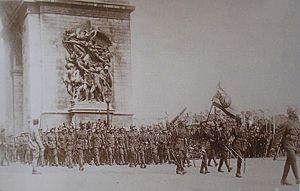
On July 22, 1917, King Vajiravudh declared war on Germany and Austria-Hungary. He joined the Allied Powers. He saw the war as a chance to strengthen Siamese nationalism. He changed the Flag of Siam from a flag with an elephant to a new tricolor flag (red, white, and blue). Some people believe King Vajiravudh is the father of Thai nationalism.
Siam sent troops to Europe during World War I. They were the only Southeast Asian troops in the European war theater, apart from those drafted by the French. The Siamese soldiers did not see much fighting because they arrived near the end of the war. However, taking part in the war helped Siam later negotiate with Western countries as a partner. Siam's involvement also led to the creation of the Royal Thai Air Force.
Financial Challenges and Later Years
In 1917, the price of silver increased so much that silver coins were worth more as metal than as money. People started melting down the coins. The government had to change the coins to use less silver and later introduced paper money for 1-baht notes.
Even with financial problems, railway construction continued. The railway reached Narathiwat and expanded north and east. The building of the Rama VI Bridge over the Chao Phraya River in Bangkok began in 1922. In the same year, the railway reached Chiang Mai. However, the country's money situation was difficult, and Siam had to take a large loan from Britain.
In 1923, King Vajiravudh announced six principles for governing Pattani Province. He focused on local freedom and fair taxes.
Personal Life
Vajiravudh as a Writer
King Vajiravudh was a very talented writer. He wrote many modern novels, short stories, newspaper articles, poems, plays, and journals. He translated many works from English and French literature into Thai. Among his translations were three plays by William Shakespeare: The Merchant of Venice, As You Like It, and Romeo and Juliet.
He also wrote many pieces that promoted Thai nationalism. One of his famous nationalistic works is "The Honour of Tiger Soldier." King Vajiravudh also wrote non-fiction books.
The King was one of the first writers to introduce mystery and detective stories to Thai readers. He translated Agatha Christie's Hercule Poirot novels into Thai. He also created his own Siamese detective character named "Nai Thong-In," inspired by Sir Arthur Conan Doyle's Sherlock Holmes.
King Vajiravudh knew a lot about Sanskrit and Hindu stories, like the Ramayana and the Mahabharata. He translated many stories from these epics into Thai and wrote plays based on them. He was so inspired by Rama, a hero from the Ramayana, that he made it a tradition for all Thai kings of the Bangkok era to be called "Rama" in English. He himself was known as "Rama VI."
Marriages
King Vajiravudh was king for about ten years before he married. In 1920, he became engaged to Princess Vallabhadevi. However, he ended the engagement four months later.
In 1921, Vajiravudh married Prueang Sucharitakul, who became Lady Sucharitsuda. He then married her sister, Prabai Sucharitakul, who became Lady Indrani. In 1922, Lady Indrani was made a Princess and Queen Indrasakdisachi. However, she had two miscarriages. In 1924, Vajiravudh married Krueakaew Abhaiwongse, who was later named Suvadhana. Queen Indrasakdisachi was then given a lower title in 1925.
Vajiravudh had only one child, a daughter, with Suvadhana. Her name was Princess Bejaratana Rajasuda (1925–2011).
Succession Law and Death
In 1924, Vajiravudh created a new Law of Succession. This law decided how the throne would be passed down in the Chakri dynasty. It stated that the throne would go to the king's sons and grandsons first. If there were no sons, it would pass to his eldest full brother (a brother with the same father and mother). The law also said that princes whose mothers were foreign could not become king.
In November 1925, it was announced that King Vajiravudh was ill. Princess Consort Suvadhana was pregnant at the time. Vajiravudh then gave instructions for who would become king next. If Princess Suvadhana gave birth to a son, he would be the next king. If not, the throne would go to his surviving brother, Prince Prajadhipok of Sukhothai.
On the night of November 25, Princess Suvadhana gave birth to a daughter. This was just two hours before King Vajiravudh passed away on November 26, 1925. Vajiravudh saw his only daughter for the first and only time before he died. The throne then passed to his brother, Prajadhipok, who named Vajiravudh's daughter Princess Bejaratana.
Tributes to King Vajiravudh
Honors
| Monarchs of the Chakri dynasty |
|
|---|---|
| Phra Buddha Yodfa Chulaloke (Rama I) |
|
| Phra Buddha Loetla Nabhalai (Rama II) |
|
| Nangklao (Rama III) |
|
| Mongkut (Rama IV) |
|
| Chulalongkorn (Rama V) |
|
| Vajiravudh (Rama VI) |
|
| Prajadhipok (Rama VII) |
|
| Ananda Mahidol (Rama VIII) |
|
| Bhumibol Adulyadej (Rama IX) |
|
| Vajiralongkorn (Rama X) |
|
Military Ranks
- Field Marshal, Admiral of the Fleet and Captain General of the Wild Tiger Corps
- Honorary General, British Army
National Honors
 Thailand:
Thailand:
- Knight (and Sovereign) of the Most Illustrious Order of the Royal House of Chakri
- Knight (and Sovereign) of the Ancient and Auspicious Order of the Nine Gems
- Knight Grand Cordon (and Sovereign) of the Most Illustrious Order of Chula Chom Klao
- Knight Grand Commander (and Sovereign) of the Honourable Order of Rama
- Knight Grand Cordon (and Sovereign) of the Most Exalted Order of the White Elephant
Foreign Honors
 Sweden: Knight of the Order of the Seraphim, 14 July 1897
Sweden: Knight of the Order of the Seraphim, 14 July 1897 Denmark: Knight of the Order of the Elephant, 27 July 1897
Denmark: Knight of the Order of the Elephant, 27 July 1897 Spain: Knight of the Order of the Golden Fleece, 15 May 1902
Spain: Knight of the Order of the Golden Fleece, 15 May 1902 Italy: Knight of the Supreme Order of the Most Holy Annunciation, 1 April 1901
Italy: Knight of the Supreme Order of the Most Holy Annunciation, 1 April 1901 Austria-Hungary: Grand Cross of the Royal Hungarian Order of St. Stephen, 1902
Austria-Hungary: Grand Cross of the Royal Hungarian Order of St. Stephen, 1902 United Kingdom:
United Kingdom:
- Honorary Grand Cross of the Order of the Bath
- Honorary Knight Grand Commander of the Most Exalted Order of the Star of India, 26 April 1918
- Honorary Grand Cross of the Royal Victorian Order, 21 April 1902
 German Empire: Knight of the Order of Merit of the Prussian Crown, 30 May 1902
German Empire: Knight of the Order of Merit of the Prussian Crown, 30 May 1902 Baden: Knight of the House Order of Fidelity, 1902
Baden: Knight of the House Order of Fidelity, 1902 Japan: Grand Cordon of the Order of the Chrysanthemum, 9 December 1902
Japan: Grand Cordon of the Order of the Chrysanthemum, 9 December 1902
See also
 In Spanish: Vajiravudh para niños
In Spanish: Vajiravudh para niños
- 1924 Palace Law of Succession
 | Aurelia Browder |
 | Nannie Helen Burroughs |
 | Michelle Alexander |


